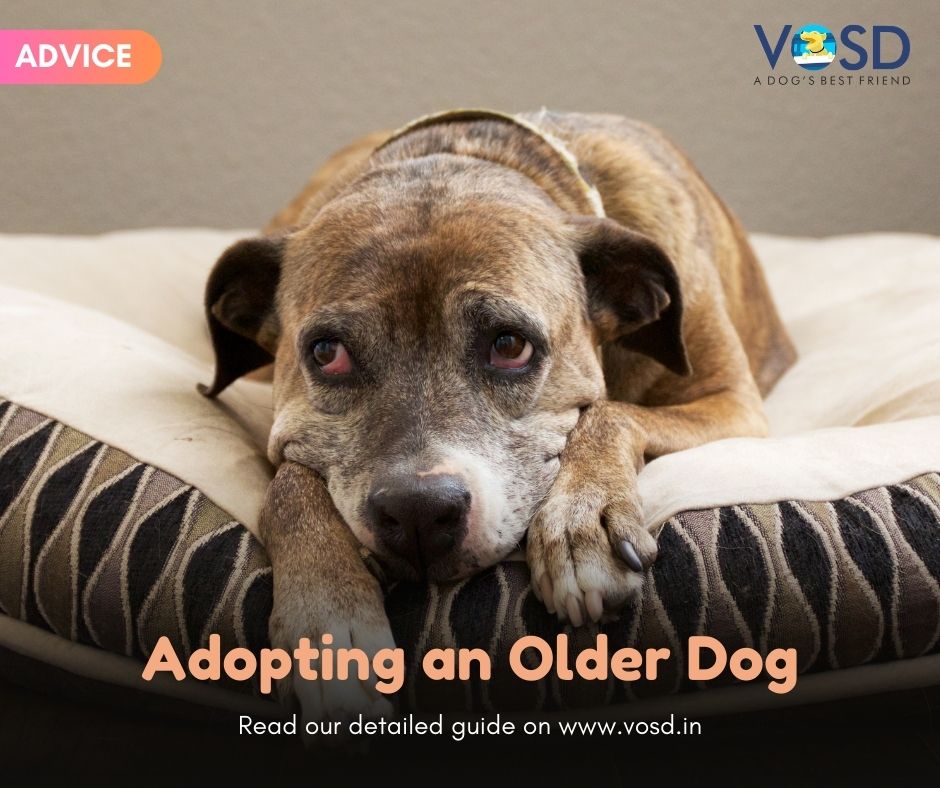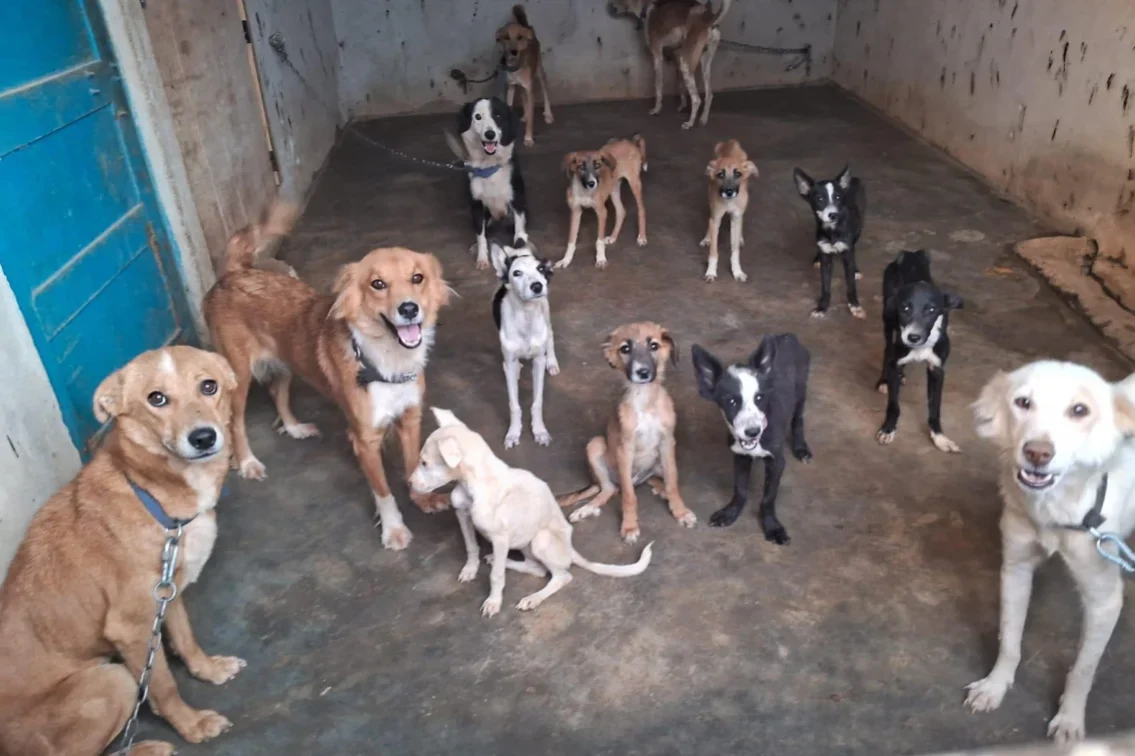When one thinks of adopting a dog, rarely do people consider adopting an older dog instead of a puppy. It may surprise you, but the perks of rehoming senior dogs can often outweigh those of adopting puppies! Having said that, the challenges of each are different and it depends person to person what dog would be best for you, so it’s important to evaluate the pros and cons of adopting an older dog for yourself.
Pros #1
Older dogs needing homes require a lot less time, effort and training as opposed to puppies.
Adopting a 2 year old dog for example, means that the dog is no longer ‘teething’ like a puppy would, so will likely not chew up your furniture or his own bed if you’re not keeping a vigilant eye all the time. Depending on the history of the senior dogs for adoption, if the senior dog is coming from a home – the dog may already be toilet trained and disciplined – saving you a lot of required puppy training.
Pros #2
Elderly dogs for adoption are well known to their caregivers and so you will be able to evaluate whether they are right fit for you, before you adopt.
Unlike puppies, where their personality develops over time, with older dogs you will already know details like their personality type and grooming requirements and how this will affect your lifestyle.
Adopting an older dog from a shelter often means the dog is well socialised / his temperament with other dogs and people is well known. With puppies on the other hand, you will need to socialise your puppy adequately to ensure the puppy does not develop aggression towards others.
Pros #3
The experience of adopting a 6 year old dog vs. adopting a 6 week old puppy is very different, in terms of how much exercise they need and how much energy they have. This will impact your lifestyle, routine and schedule, so if you have comparatively less time to dedicate to your furry friend, an older dog may be the better choice for you.
Puppies will keep you on your toes for every one of their waking minutes, while older dogs are a lot more calm overall. Their exercise needs also vary depending on their breed, so do your research and find the right fit for yourself!
Challenges #1
Another difference between say, adopting a 5 year old dog vs. adopting a young puppy, is how engaged and active they may seem; and how easily they trust you.
Puppies, like young children are excitable, fearless and adjust easily to new experiences. An older dog on the other hand, like adult humans, have had comparatively more negative experiences and learnings. Your older dog by now, has outgrown its excitable puppy days and bonded with a family that for reasons not understood by him, has left him. Learning from that experience, the senior dog may be hesitant to trust you initially, but once that trust has been built, you can count on receiving his unwavering loyalty. They say rescued dogs know that they have been rescued, and love their humans all the more for it. So while your bond may initially take a longer adjustment time to build, it will be worth it in every way.
Challenges #2
“Dogs’ lives are too short. Their only fault really.” – Agnes Turnbull.
Dogs usually live between 10-15 years on an average, a lifespan that no matter how much, will always feel too short for the humans who love them.
The older the dog you adopt therefore, implies they are that much closer to developing age-related health issues and crossing the rainbow bridge. Having said that, younger dogs can also always develop unexpected health issues. As life teaches us time and again, people come and go from our lives for millions of unexpected reasons, so we can’t let the fear of losing someone stop us from loving them, can we?
Challenges #3
Just as people struggle with mobility as they get older, so do dogs.
As dogs get older, like us humans, often they develop issues with weakening bones and struggle with walking. Staircases and getting in and out of cars can become a strain for their weakening bodies and before considering older dogs for rehoming, it may be best to be prepared for such eventualities. While this is a likely situation for all dogs, when adopting senior dogs, you will likely face mobility issues sooner because they are already older.
If managing the mobility of a big dog, such as a labrador, seems like a point of concern for you, smaller breeds like- older pugs for adoption, may be a better fit for you.
Adopting an Older Dog from a Shelter: 5 Quick Tips
- Adopting a dog is a serious commitment. If you are unsure for any reason, you could always consider fostering the dog for a shorter duration before you commit to adoption. However, do keep in mind adjusting to new homes and new families can be stressful for dogs and each dog, like each human, takes their own time to open up and trust and so the less changes the dogs are subjected to, the better, for their sake.
- To find dogs for adoption, you can search online on google or social media platforms for terms like “older dogs for adoption near me”. Results will lead you to dog shelters; foster parents or dog rescuers who have dogs who are looking to be adopted. You can also directly search for dog shelters near you and enquire about older, adoptable dogs.
- If you are looking for older labradors for rehoming, make sure you check the nearest old dog sanctuary for retired army / police dogs near you. Labradors are commonly trained as sniffer dogs in the armed forces in India and make excellent companions. Older German Shepherds for adoption can also be found at these centers and while they make excellent guard dogs because of their training, they may not be suitable for families as they are often trained for combat. Retired service dogs have spent their entire lives working in extreme conditions for our country and a loving home, during their golden years, is the least we can offer them.
- Once you have found older dogs available for adoption, do have detailed conversations with their current caregivers to find out as much as possible about their history i.e. medical history; personality & behaviour type; meal schedules and current diet; compatibility with other people, children and animals; previous training details and potential triggers that make the dog uncomfortable. The more you can integrate things that the dog is already used to into your home, the easier it will be for your dog to adjust to his new home. For example, for dogs who have been used to receiving commands in english, it is easier to continue using the same english words when communicating with the dog instead of trying to teach them new words for the same actions. This will help you and your dog adjust with each other better and faster.
- Do prepare yourself for the changes coming in your own lifestyle when you adopt a senior dog. This can include – scheduling and maintaining regular Vet check-ups for your dog and integrating any required mobility solutions into your lifestyle. Dogs also love routines, therefore planning your life around their scheduled meals and exercise times would benefit you both.
Can’t Adopt an Older Dog, Why Not Sponsor Instead?
If you find that adopting an older dog is not your cup of tea, but you still deeply care for them, there are other ways you can support senior dogs. Here are some ideas:
- You can ‘virtually adopt’ aka sponsor the care of senior dogs at old dog sanctuaries. At VOSD Sanctuary and Hospital, we have hundreds of rescued senior dogs, who have nowhere else to go. Dogs live with us for life and have been brought from over 30+ cities from across India. The dogs who live with us at VOSD, have been through the worst of human abuse; abandoned or live with ‘special needs’. You can sponsor the care of our dogs – click to know more
- You could also support our efforts to care for senior dogs at VOSD, by volunteering with us. Visit this link to know more and apply for our volunteering opportunities.





